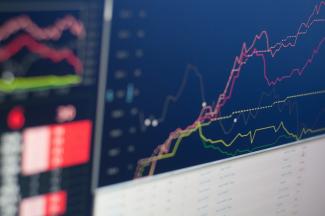
Understanding Meme Stocks
Key Takeaways
- Meme stock frenzy has once again taken hold of investors in 2021.
- While meme stocks have generated supersized returns, it has done so with supersized risk as well.
- Despite the sharp rise and possible eventual fall in meme stocks, its impact on the broad market likely remains muted given the diversified nature of the broad index which houses many of these stocks.
Over the last year shares of movie theater company AMC Entertainment holdings, Inc. (AMC) and a retail video game store GameStop Corp. (GME) have soared. Posters like “AMC to the Moon” are popping up everywhere in yet another sign of the retail frenzy over ‘meme’ stocks. However, the meme stock mania is more than just a phenomenon.
What are meme stocks?
The term meme originates from the Greek term mimema, meaning ‘imitated’. In current times, a meme stock is one that has become popular with retail investors and has gone “viral” on social media platforms, often leading to higher share prices even to the point where prices seem disconnected from underlying fundamentals like company earnings.
What’s started this mania?
There are two main contributing factors that have caused meme stock mania to take stronghold. Commission-free trading and simple-to-use apps like Robinhood have made it much easier for amateur investors, looking for both a diversion from boredom and a jackpot, to pour money into stocks like AMC and GME.
Should you buy meme stocks?
It’s tempting to jump in and join the hype when supersized returns are a potential. However, it is also accompanied with supersized risk. The chart below, shows the one-year price return and risk, as measured by the standard deviation as of 6/11/2021, for AMC and GME alongside the returns for the broad market of S&P 500 and the small cap index Russell 2000. Both AMC and GME are part of the small cap universe in the Russell 2000 index.
To put the returns and risk in perspective, the broad market S&P 500 and the small cap stocks have generated stellar returns over the last year with risk in line with long-term averages. These returns and risks are in stark contrast to the meme stocks, which have shown explosive returns in a short period of time but not without extreme risk as well.
Has the stock market turned into a casino?
The surge in the shares of AMC has vaulted the company into the ranks of some of the world’s most valuable companies despite a struggling business model. This has naturally led investors to wonder whether the eventual bust of these stocks will cause a crash in markets.
To answer that question, a look into the composition of the small cap index of the Russell 2000 index, which includes some of the meme stocks, is helpful. To start, the breakdown of Russell 2000 index stocks is more diversified than the S&P 500. The top 10 stocks in the Russel 2000 make up just 4% of the index whereas the top 10 stocks in the S&P 500 make up nearly 28% of the index.
|
Security |
Returns (%) |
Risk (%) |
|
Large Cap Stocks: S&P 500 |
43.8 |
16.0 |
|
Small Cap Stocks: Russell 2000 |
74.1 |
23.8 |
|
AMC |
855.5 |
356.1 |
|
GME |
5,239.6 |
275.6 |
Source: FactSet
This broad diversification means that strong gains or falls in the index relies on participation from a much larger number of stocks, compared to the S&P 500. So even when you get these outsized gains from companies like AMC and GameStop, they don’t have an outsized impact on the overall market. The same applies when there is an eventual bust of these stocks.
The bottom line is that investing in meme stocks is extremely risky. Sure, there will be some winners, but there will also likely be a lot of losers. It is also important to differentiate short-term trading fads from long-term investing. For now, we can take consolation that the entire stock mark will not likely crash and burn due to the mania of a few small stocks.
Source: https://awealthofcommonsense.com/2021/06/some-random-thoughts-about-inflation-amc-small-caps/

